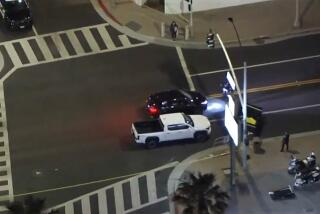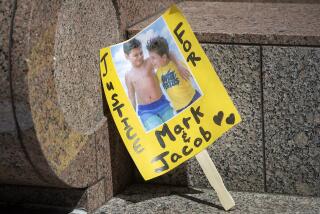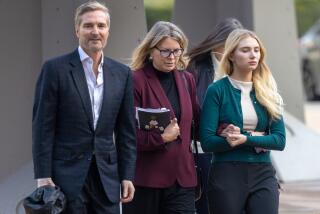Experts at Ornelas Trial Differ on Fatal Car’s Speed
- Share via
Jurors heard widely conflicting views from expert witnesses Wednesday about how fast a young driver was going when his car struck and killed a Newport Beach mother on Sept. 1.
A professor at Cal State Long Beach testified for the prosecution that his calculations showed Danny David Ornelas was driving 58 m.p.h. when the car hit Debbie Killelea in an alley behind her home on Balboa Peninsula.
But a defense witness who is a professor at Cal Poly Pomona testified that his calculations showed Ornelas was driving between 34 and 37 m.p.h.
The testimony came during the final day in the second-degree murder trial of 19-year-old Ornelas before Orange County Superior Court Judge Luis A. Cardenas in Westminster.
Cardenas said the attorneys will summarize their arguments Monday morning and the case will go to the jury.
Deputy Dist. Atty. Thomas Goethals said outside court Wednesday that he is not worried about the experts’ disagreement over the speed at which Ornelas was driving.
“Once you reach certain speed levels, the exact speed makes absolutely no difference, as far as I’m concerned, and that’s what I’m going to tell the jury,” Goethals said. “This is not a case that’s about a battle of experts.
“This is a case that’s about a battle of common sense versus total irresponsibility, as far as I’m concerned. . . . Once (a driver) gets going at a certain rate of speed, whether he’s going probably 30 or 40 or 50 down that alley doesn’t make a whole lot of difference to me. . . .”
Goethals said his case has stressed that Ornelas performed an “inherently life-threatening act” by driving a car at unsafe speed down the narrow alley. In a second-degree murder case, Goethals said, it is not necessary to prove that the defendant intended to kill the victim.
Goethals said the legal speed limit in the alley was 15 m.p.h.
“The defendant was going at least twice that speed,” Goethals said.
The prosecution’s witness Wednesday was Warren E. Clark, a former California Highway Patrol officer who now teaches at Cal State Long Beach and Golden West College. Clark said he is an expert in analyzing car accidents, based on academic training and 15 years of experience with the CHP.
Clark told the jury that he disagrees strongly with expert witness Ted A. Mitchell, who testified Monday that Ornelas was driving about 32 m.p.h. Mitchell also testified that his analysis showed Ornelas was trying to avoid hitting the woman.
Clark set the speed at 58 m.p.h. and said he did not believe Mitchell’s contention that Ornelas acted “prudently” in trying to avoid Killelea.
Witness Edward M. Kelly, however, sharply contradicted Clark on Wednesday. Kelly, a physics professor at Cal Poly Pomona since 1957, told the jury that Clark’s formula for computing the car’s speed was in error. Pointing to Clark’s figures on a blackboard, Kelly said: “All these calculations are completely fallacious. There is no value whatsoever in any of these calculations.”
Kelly contended that correct calculations would show that the car was going 34 to 37 m.p.h.
Much of the testimony Wednesday involved esoteric math and calculus equations.
Killelea, 37, was walking with her two young sons behind their East Ocean Boulevard home when she was killed. Ralph Bencangey, the defense attorney, has told the jury that Ornelas, of Huntington Park, drove the car. But Bencangey has repeatedly argued that Ornelas should not be on trial for murder but rather for vehicular manslaughter.
More to Read
Sign up for Essential California
The most important California stories and recommendations in your inbox every morning.
You may occasionally receive promotional content from the Los Angeles Times.













